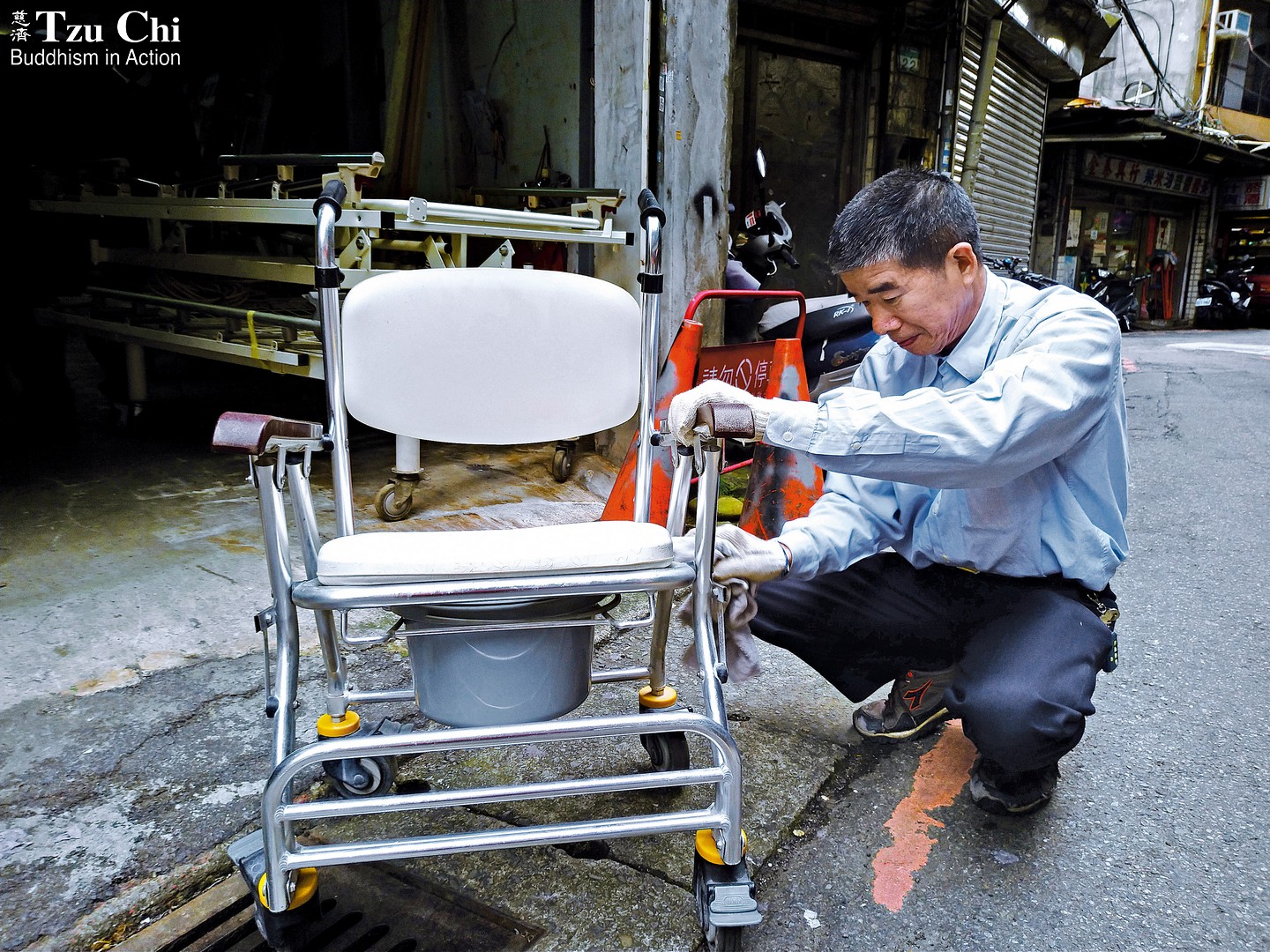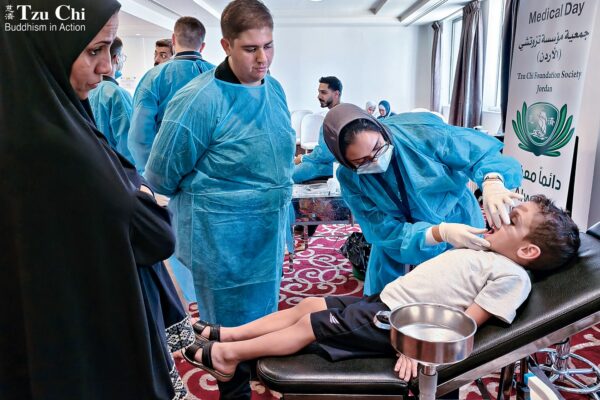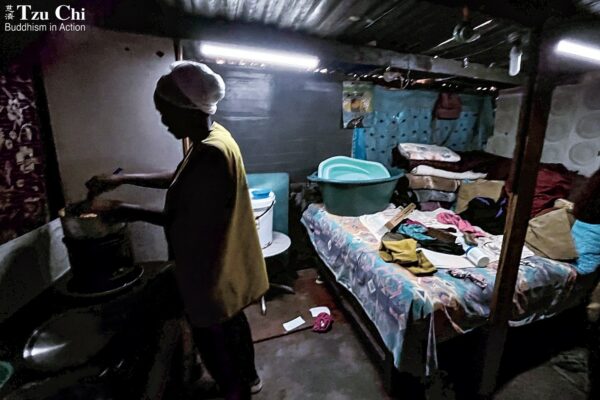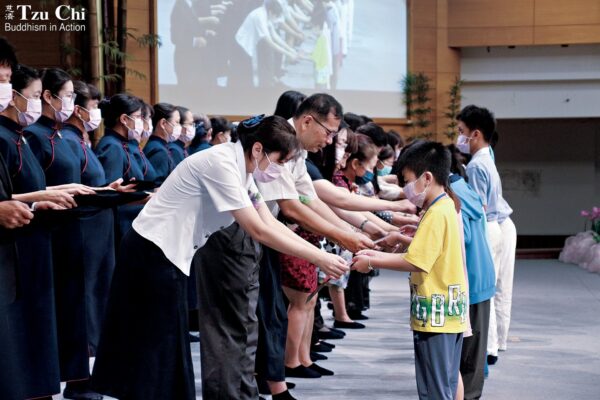By Xie Guo-rong, Huang Chao-chang, Lin Pei-zhen, and Cheng San-ling
Translated by Wu Hsiao-ting
Photos by Lin Pei-zhen
Tzu Chi volunteers in Taiwan recycle and provide second-hand assistive devices and medical equipment to those who need them. Such a service extends the life of the equipment and eases the financial burdens for patients and their families.
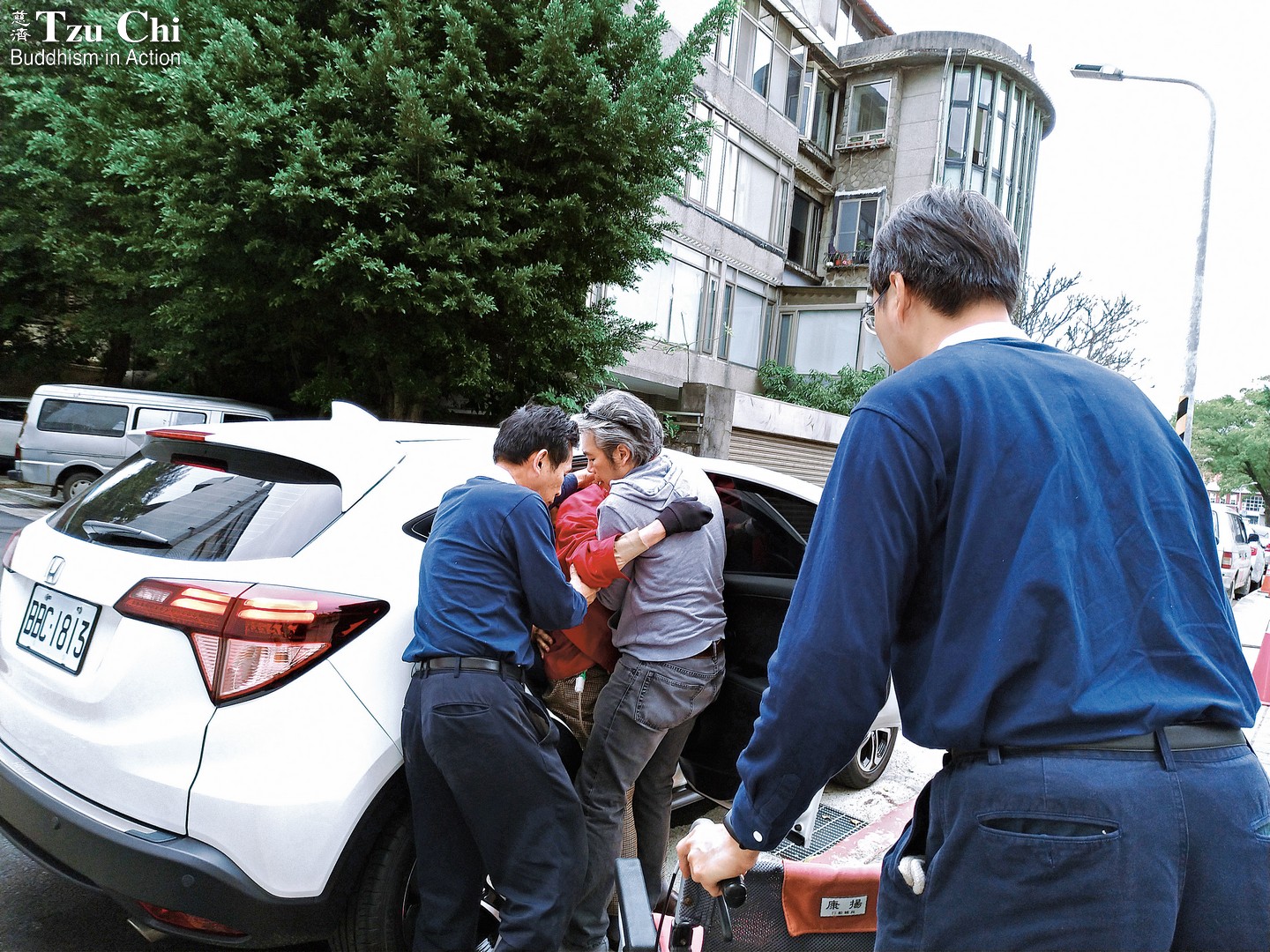
Volunteer Xie Guo-rong (left) and Mr. Zeng (in the gray shirt) help the latter’s mother out of a car and into a wheelchair. The Zeng family had requested that volunteers deliver a wheelchair and other assistive equipment to them.
What are assistive devices? And who needs them?
Assistive devices help people carry out their daily activities more easily and safely. They are used primarily by persons with disabilities, the elderly, or patients who have difficulty taking care of themselves due to illness or injury. Examples include wheelchairs, walking aids, and electric beds. Such devices can alleviate the effects of disabilities and make a caregiver’s job easier.
An assistive device is easy to obtain if one is staying in a medical or nursing facility, but what about those who need such equipment after being discharged from such a facility? An oxygen concentrator or electric bed can cost tens of thousands of Taiwanese dollars (one U.S. dollar is about 30 Taiwanese dollars). A wheelchair is not cheap either. Taking care of seriously ill family members is already emotionally and physically demanding enough—the added financial burden from having to purchase assistive equipment just contributes to the stress of family members, especially for those who are economically strained. Furthermore, buying assistive equipment carries an additional burden of deciding what to do with it should it no longer be needed. Is it better to let the equipment sit idle, or dispose of it?
Let love reach more people
In 2006, a group of Tzu Chi volunteers went to extend their care and support to a Tzu Chi sister whose son had become paralyzed from the shoulders down as a result of a traffic accident. During their visit, another volunteer happened to deliver a used electric bed to the household for the disabled son to use. When this volunteer was leaving, the Tzu Chi sister tried to give him some money to cover the fuel for the delivery, but the volunteer adamantly refused to take it. He left after successfully turning down her offer of money.
One of the members from that group of volunteers was Xie Guo-rong (謝國榮). The incident impressed him and piqued his curiosity about the service the volunteer had provided. A few days later, he visited the volunteer, who due to a lack of space stored the assistive devices and medical equipment that he had collected on apartment floor landings. When asked about his service of collecting second-hand medical equipment and delivering it to people in need, he said: “Master Cheng Yen says that illness often plunges people into poverty, while the poor tend to develop severe illnesses because they cannot afford treatment for common diseases. I’m just doing what I can to help those who have been stricken by misfortunes and have found their finances stretched thin.”
This volunteer, with his elderly mother in tow, drove an old truck everywhere to put assistive and medical devices in the hands of those who needed them. His altruistic spirit and actions moved Xie to no end. He pledged right there and then to follow in this volunteer’s footsteps and give the same service. He also decided to work toward establishing an online assistive device platform to help more people.
True to his pledge, Xie began delivering recycled patient beds and other equipment to needy families. Every delivery was a moving experience for him and further strengthened his determination to stay the course. Whenever he learned of anyone in need of his service, he’d put aside his design business and travel to wherever he was needed around Taiwan to make free deliveries. Making five or six deliveries in a day was typical for him. He and his team served countless people over the course of more than a decade.
On March 23, 2017, after Xie’s incessant efforts, an online assistive device platform for Hualien, eastern Taiwan, was established. In 2018, with the help of the director of the Tzu Chi Department of Charity Mission Development, Lu Fang-chuan (呂芳川), and his colleagues, the platform was expanded to serve the entire area of eastern Taiwan. Anyone in Hualien and Taitung, which comprise the mountainous eastern part of Taiwan, can access Tzu Chi’s service via the platform.
Immediately afterwards, more platforms were set up for northern Taiwan. Group chats were created on a messaging app to spread and exchange information. The equipment circulating via the platforms came from private sources as well as Tzu Chi recycling stations. Information about what equipment has been provided to which families, and for what reasons, is listed on the platforms to avoid any misunderstanding that the foundation is making a profit from the service.
A cycle of goodness
At the beginning of 2019, a location where recycled assistive devices can be stored and where volunteers can gather to repair and maintain the equipment was set up in Taipei. It opened for the first time on March 16 of the same year. A small group of volunteers came together to organize equipment by type, and to separate the devices that were in good working order from those that needed repairs and further work.
Zhang Jin-xiong (張進雄) was one of the volunteers doing this work. His late mother had been a dementia patient, and he had once adapted a portable toilet chair for her to use. Before she passed away, his mother had become bedridden due to a fall, so Tzu Chi volunteer Wang Qiu-man (王秋滿) suggested he apply to the Tzu Chi assistive device program for an electric bed for her to use. Zhang submitted the application, and before long Xie Guo-rong and other volunteers delivered the bed to his home, located on the third floor of a walk-up apartment. Zhang was deeply touched when he saw the volunteers maneuver the bed up the narrow stairs to his home.
When he needed help, the Tzu Chi volunteers, who were strangers to him, reached out to him without asking for anything in return. Inspired by their selfless work, he decided to pay back by helping other needy people. That’s how he began helping the program repair and maintain electric wheelchairs. After his mother passed away, he also gave her toilet chair to the program for circulation.
Delivery
One day at noon, a patient’s family called and asked for Tzu Chi’s assistive device service. The patient was to be discharged from the hospital that very afternoon, and her doctor had told her family that she would need an electric bed, a wheelchair, a portable toilet chair, and other equipment to use at home. Xie Guo-rong and another volunteer, Zeng Li-wen (曾立文), had already made two deliveries that morning, but as soon as they received the request, Xie quickly finished his lunch to get ready for another one. At the same time, volunteer Lai Yun-xin (賴雲新) checked the wheelchair to be delivered to make sure it was in good working order. He also cleaned the toilet chair to be delivered. Volunteers always make sure that every item is in good condition before delivering them.
Xie and another volunteer arrived at the building just as the patient and her two sons arrived back home in a car from the hospital. Mrs. Zeng, the patient, was suffering from cancer. She had developed ascites and was no longer able to walk on her own. Xie pushed the wheelchair to the family’s car for her to be transferred into it. One of the sons slowly pushed his mother outwards from inside the car while the other son stood at the car door to lift his mom into the wheelchair. “Mom, put your hands on my shoulders,” the son at the car door said. “Mom, I’m lifting you up…. Mom, I’m putting you in the wheelchair.”
Once Mrs. Zeng was seated properly in the wheelchair, the son started pushing her towards their home. He looked heavy-hearted. When they reached some steps leading to an elevator, the son insisted on lifting the wheelchair with his mom in it up the stairs on his own. He walked laboriously up the steps, then softly put his mom down and pushed her into the elevator. The volunteers followed silently behind, carrying the toilet chair they had brought, their hearts touched by the son’s gentle care of his mom.
Once they were inside the house, Xie went with the son into Mrs. Zeng’s room to measure the space available for the electric bed. Then Xie placed a call to volunteer Zeng Li-wen at the assistive device storage quarters to confirm with him the size of the bed for Mrs. Zeng. After that, Xie discussed with the son how to best fit the bed into the room so that his mother, who couldn’t lie flat on her back because of her ascites, could have a comfortable place to rest. They also settled on a time when the bed would be delivered to their home.
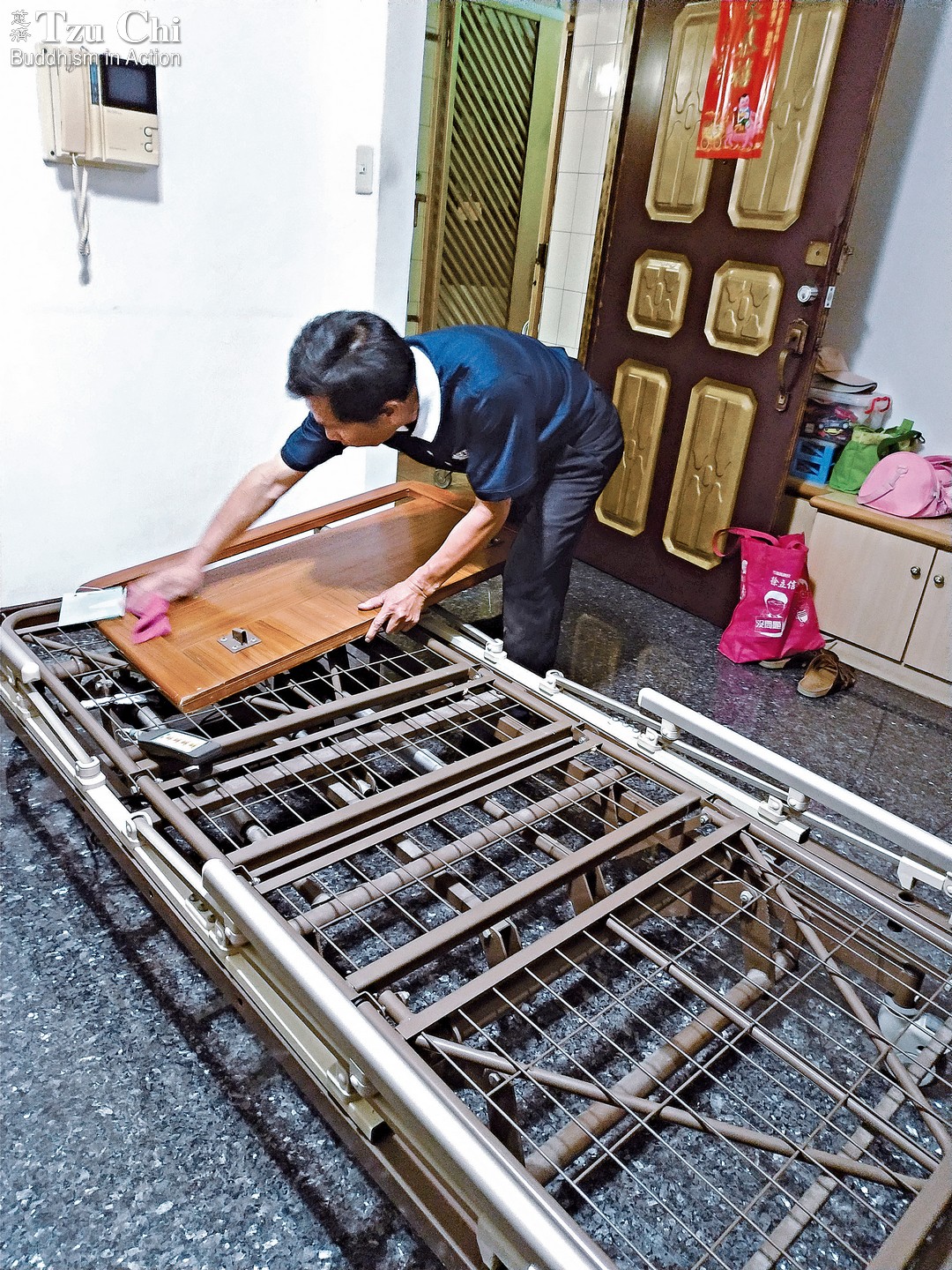
Xie made a second trip to the Zeng family to deliver an electric bed.
A bowl of noodles
A bowl of instant noodles once left such a deep impression on Xie that even though he didn’t touch a bit of it, he would never forget about it.
On January 1, 2019, Xie was asked to deliver an electric bed to Hsinchu, northern Taiwan, for an 89-year-old Mr. Zhang to use. His daughter-in-law, Liao, had applied for the bed for him. This was the second time Xie had served this family.
In 2018, Liao had applied for an electric bed, a portable toilet chair, and other assistive equipment for her husband, a cancer patient. More than a month after the equipment was delivered to their home, Xie received a phone call from Liao asking for the equipment to be taken back since they no longer needed the items. When Xie went to collect the equipment, two children in the family pitched in to help him out. One of them was an elementary school student.
In 2019, when the child saw Xie again, he asked him curiously, “Sir, you work on a holiday too? Is this your job?”
“No,” Xie answered. “I’m doing this as a volunteer.”
While Xie was discussing with older members of the family where to put the bed, the boy went to get a glass of juice for him. “Sir, take a break and have some juice.” Xie politely declined the offer, but the boy wouldn’t give up, and he kept trying to persuade him to drink the juice. Then, as if he had suddenly recalled something, the boy ran into the house.
A few minutes later, Xie and the boy’s uncle began moving the bed into the house. When they passed through the kitchen to get into a room, Xie saw the boy inspecting several instant noodle packets in front of him. It looked like he was going to prepare some noodles to eat.
After Xie had helped put the bed in place and explained to the family how to operate it, he got ready to leave. But before he could do so, the boy stopped him, saying, “Sir, I’ve prepared this bowl of instant noodles for you. I know you haven’t had dinner yet. I made sure it’s vegetarian so it’s okay for you to eat.”
Just as with the juice, Xie declined the boy’s kind offer. The boy said to him anxiously, “I know you have your principles, that you cannot accept anything from us. But if you pretended you were buying the noodles from me, then could you eat them?” This sweet, thoughtful child really won Xie over.
“I really appreciate it, child. Eat them for me,” Xie said to him.
The gratitude the boy showed warmed Xie’s heart beyond measure and their interaction became one of Xie’s most cherished memories.
Countless heart-warming stories like the one above have taken place during the delivery trips volunteers make to families. A patient or family member’s grateful look or simple gesture of appreciation is enough to touch a volunteer to no end and keep him going. Hopefully, through Tzu Chi’s assistive device service, more recycled second-hand medical equipment can gain a new lease of life and benefit more people.
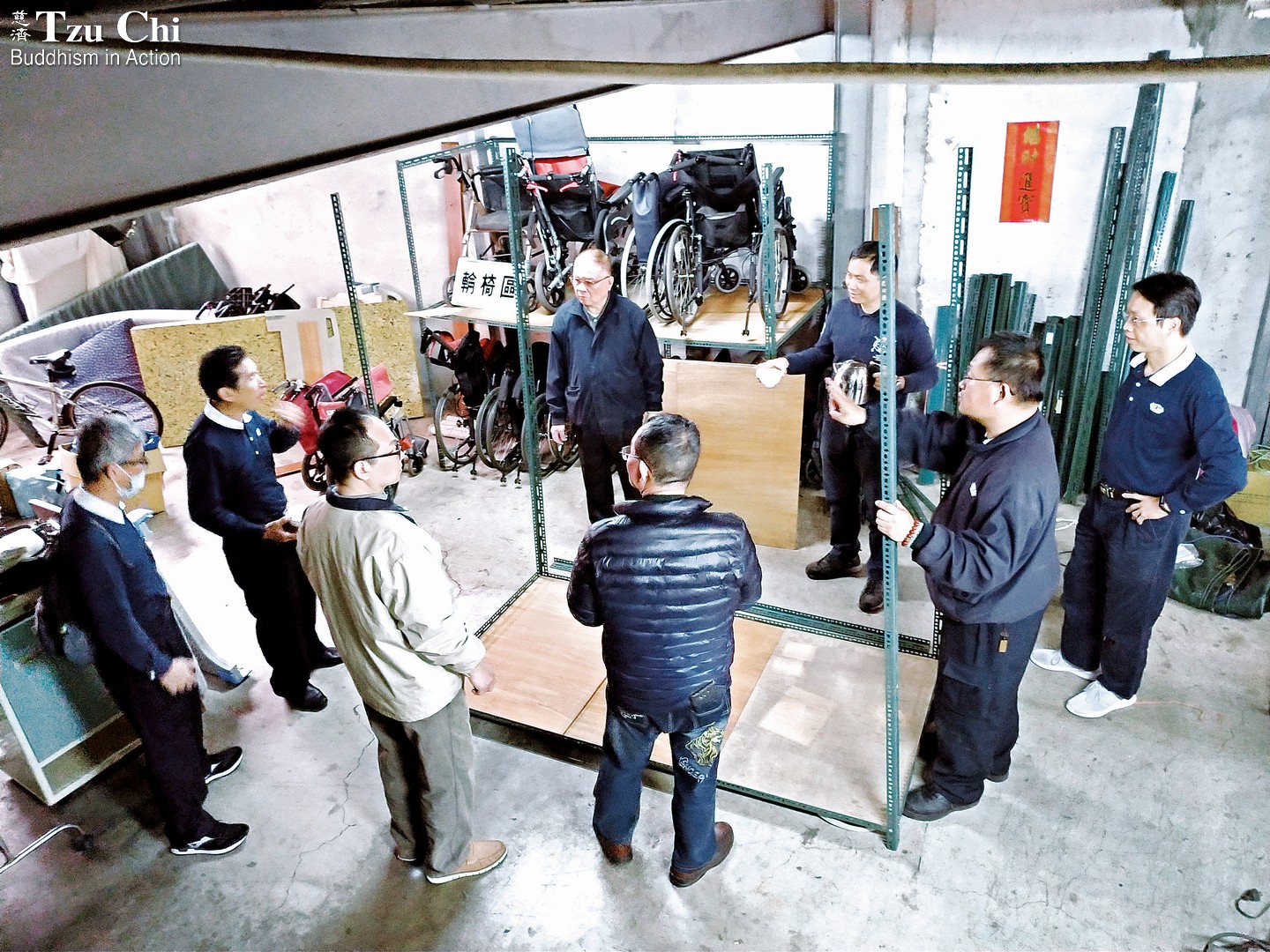
Volunteers gather to maintain, repair, and organize recycled assistive devices and medical equipment.
Volunteer Lai Yun-xin cleans a portable toilet chair and makes sure it is in good working order before it is delivered to a family.
